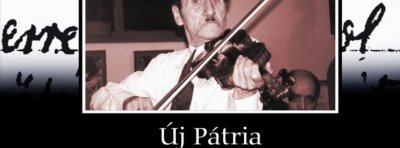
Garamszőlős - Original Village Music from Slovakia’s Lower Garam/Hron River Region - New Patria series
When the founders of our folk-music research program named our venture the “Last Hour”, they unfortunately, they selected a painfully appropriate name. Without exception, all musicians who arrived at the Fonó Music House studio were considered the last living representatives of this instrumental music tradition and we knew that the recording we were about to make, would probably be the last snapshot in many cases.
Although it was also presumable that this would probably be the last time that these band members of János Fekecs would play together, we were all shocked by the death of Gyula Rikkony of Garamszentgyörgy, who died in front of the entrance to the music house three days into the recording, on the morning of 2nd February, year 2000. He was the last hammered dulcimer player from the village and also a very talented contrabassist, who aided his band by playing bass on the recordings. He travelled to Budapest to play music and pass away.
After we bid him farewell, we realised that we not only lost a talented musician, but a world of knowledge, of which tiny fragments now remain only in our memories and on the recordings. János Fekecs passed away in 2006 and slowly there will not be many left who carry this musical heritage in their hearts. Let this record stand as proof that the knowledge of Gyula Rikkony and the last string bands of the Garam region are not forgotten! Listen to it with love and open hearts!
1. Seprűtánc (Broom dance) 1’50”
2. Üveges tánc / Fžaškový (Bottle dance) 1’03”
3. Verbunk (Recruitment dance) 2’37”
4. Verbunk (Recruitment dance) 1’45”
5. „Áll a malom, áll a vitorlája” (magyar csárdás) (Hungarian csárdás) 1’39”
6. „Sámlit teszek a lábad alá” (kéméndi lakodalmi csárdás)
(Wedding czardas from Kéménd) 1’35”
7. Régi lakodalmi mars (Wedding march) 2’01”
8. Lakodalmi asztali mulató nóta magyaroknak (Wedding table tune for Hungarians) 2’07”
9. „Párta, párta, párta” (magyar menyasszonytánc) (Hungarian bride’s dance) 1’50”
10. „Mariskának, Juliskának” (Magyar lakodalmi asztali nóta)
(Hungarian wedding table tune) 2’14”
11. Két szlovák hallgató (Two Slovakian listening tunes) 3’13”
12. Dudanóta (Bagpipe tune) 2’19”
13. „Po valašsky od zeme” (Odzemok) 1’19”
14. „Zale sokol, biely vták” (Szlovák hallgató és szlovák csárdás)
(Slovakian listening tune and csárdás) 4’08”
15. Szlovák lakodalmi mulató nóták (Slovakian wedding tunes) 4’47”
16. „Včera bola dievka, dnes je ena” (Szlovák menyasszonytánc)
(Slovakian bride’s dance) 1’37”
17. „Ej, vysoko zornička” (Szlovák hallgató) (Slovakian listening tune) 1’51”
18. „Oeň sa Janko, vezni ma” (Szlovák „fox”) (Slovakian fox) 1’20”
19. „Hore Hronom, dole Hronom” (Szlovák hallgató) (Slovakian listening tunes) 3’29”
20. „Voly nemám” (Szlovák csárdás) (Slovakian csárdás)
„Kone, voly nemá” (Szlovák csárdás) (Slovakian csárdás) 2’23”
23. „Keď ma srdce bolí” (Szlovák hallgató) (Slovakian listening tune)
„Árva vagyok, árva” (Magyar csárdás) (Hungarian csárdás) 4’14”
24. Szlovák csárdás (Slovakian csárdás) 2’56”
25. „Orie Janík, orie, to trenčianske pole” (Szlovák hallgató) (Slovakian listening tune) 2’04”
26. Szlovák csárdások (Slovakian csárdás) 3’50”
27. Karácsonyi koledák (Slovakian carols) 3’16”
28. „Fašange, Turice” (Farsangi köszöntő nóta) (Carnival tune) 1’59”
29. Baligátor (Urban dance) 1’29”
30. Mazurka (Urban dance) 3’22”
31. Hallgató (Listening tune) 2’28”
Összidő (Total time) 71’58”
Válogatta / Selected by: AGÓCS Gergely
ADATKÖZLŐK / PERFORMERS – INFORMANTS
FEKECS János „Bínyai” (1925) – hegedű (prímás) / violin (1st)
PATKÓ Béla „Bumbaj” (1942) – hegedű (másodprímás), bőgő / violin (2nd), doublebass
SÁRKÖZI József „Tuti” (1939) – brácsa / viola
FEKECS Viliam „Doktor” (1951) – klarinét / clarinet
BALOGH Árpád „Iró” (1930) – cimbalom / dulcimer
RIKKONY Gyula (1935–2000) – bőgő / double bass